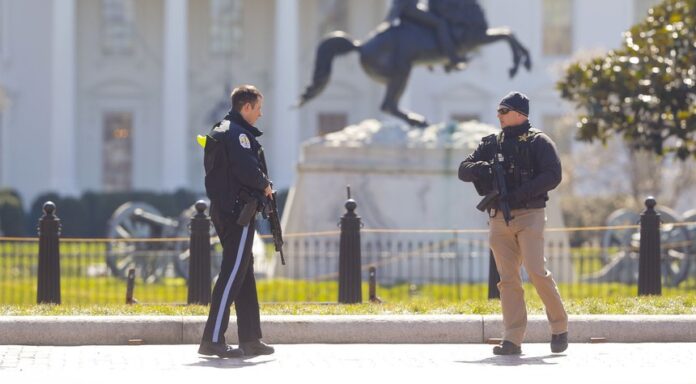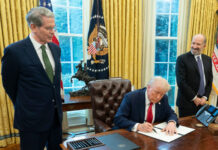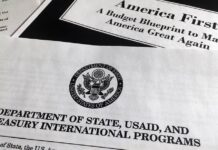A baggie of cocaine was found in the West Wing of the White House on Sunday, July 2, the Fourth of July weekend, causing a hazmat response to determine what the “white powder” was. But after numerous shifting stories from the White House about what had occurred, the Secret Service ended the investigation into who brought the cocaine into the White House without even investigating for two full weeks.
The Secret Service’s statement on the matter was weak, to say the least, and raised a lot of questions. While they tested the substance and developed a list of “several hundred” who went through the area, they said they couldn’t find any forensic evidence on the bag or determine anything from video evidence. They also didn’t even bother to question any of the people on the list. Members of Congress like Rep. Lauren Boebert (R-CO) said they had been told there were about 500 people on that list.
So The Heritage Foundation’s Oversight Project tried to get the list of the “suspects” from the Secret Service under FOIA since they closed the investigation. But the Secret Service refused to turn it over with an interesting excuse.
“As your request seeks records reflecting visitors or related information concerning the Office of the President, please be advised that these records are not Secret Service agency records subject to the FOIA,” Kevin Tyrrell, a Freedom of Information Act officer at the Department of Homeland Security, wrote in a letter obtained by The Daily Signal. “Rather, these records are governed by the Presidential Records Act, and remain under the exclusive legal custody and control of the White House.”
Steve Bradbury, a distinguished fellow at the Heritage Foundation who also led the Office of Legal Counsel in the Justice Department from 2005 to 2009, explained the distinction between the Secret Service record vs. a record that would fall under the Presidential Records Act. It “usually turns on who generates the record and whose business the record reflects. If it’s an agency record, it’s subject to FOIA. If it’s a White House record, it’s covered by the Presidential Records Act,” he said.
Does anyone believe they didn’t make a list of the suspects? But if the Secret Service didn’t even create a separate record of their own of the suspects, and/or they just don’t want to turn it over, hiding it under this excuse, what does that say about their investigation?
Hans von Spakovsky, a senior legal fellow at Heritage’s Edwin Meese III Center for Legal and Judicial Studies, explained what visitors have to do when they enter the White House.
“One of the things you have to do when you go through the security checkpoints—and keep in mind, every staff member, every visitor, has to go through a background investigation to get into the White House—they not only check you for weapons,” von Spakovsky said. “You have to go through an area where they blow air through you and they have dogs sniffing, to try to detect any kind of illegal substances, bombs, or anything else.”
“And yet they missed someone bringing cocaine into the White House? That is hard to excuse,” von Spakovsky added.
We’ve written before about how former Secret Service agent Dan Bongino isn’t buying that they can’t find the person either, and given the security, he thinks it’s family behind the cocaine. Bongino dropped interesting information that he had been told, indicating the cocaine may have been intentionally left there to be picked up.
He isn’t the only former agent saying there’s a problem here.
Former supervisory special agent Charles Marino, who worked with the Secret Service for over 20 years, is also questioning what’s going on here. He said the 500 on the list were all suspects, and they shouldn’t be let back in if the Secret Service wasn’t going to interview them.
“It could have been a staff member or a family member. Look, when you don’t find a suspect, that means that all 500-600 people that popped up during this timeframe all remain suspects, doesn’t it?
“So if that’s the case, how are you not interviewing people? I want to see the investigation be handled the way it deserves to be handled.”
Beyond conducting the interviews, Marino wants made public a chain-of-custody report on where this cocaine was sent to be tested and the test results, and assurance the video footage has been thoroughly reviewed.
“Was it at the FBI lab in Quantico, or was at another FBI facility where it was tested?” he asked. “I want to see the tests that were run on it. There should be paper trails on all of this on all of this.”
Marino also argued there is no “forcing mechanism” that could give the Secret Service any leads on whose cocaine was found.
“I think the forcing mechanism has to be, ‘Look, you senior staff member, you junior staff member who took a family tour through here, everybody, don’t come back.’ I mean, what choice do you have? Somebody is stopping this from being thoroughly investigated.”
Marino said that the way they were handling things created the impression of political influence being used.
“Political influence is only as effective as a particular leader will let it be. If you have a leader that is going to allow themselves to be influenced, again, not saying that it happened here, then yes, you can go down a very dark road.”
Exactly. It just makes no sense why this investigation was cut short and why basic things like interviewing people weren’t done. As I noted, when even Special Counsel Robert Mueller’s top guy Andrew Weissmann is calling this out as “suspicious,” you know there’s a problem.
Even Andrew Weissmann thinks the Secret Service investigation into the cocaine at The White House was a joke: "To me, the Secret Service here looks like they can't find a dead cow in a closet. I mean this is really just not a sufficient investigation…" pic.twitter.com/9rwsjzS2Nq
— Kevin Tober (@KevinTober94) July 14, 2023




